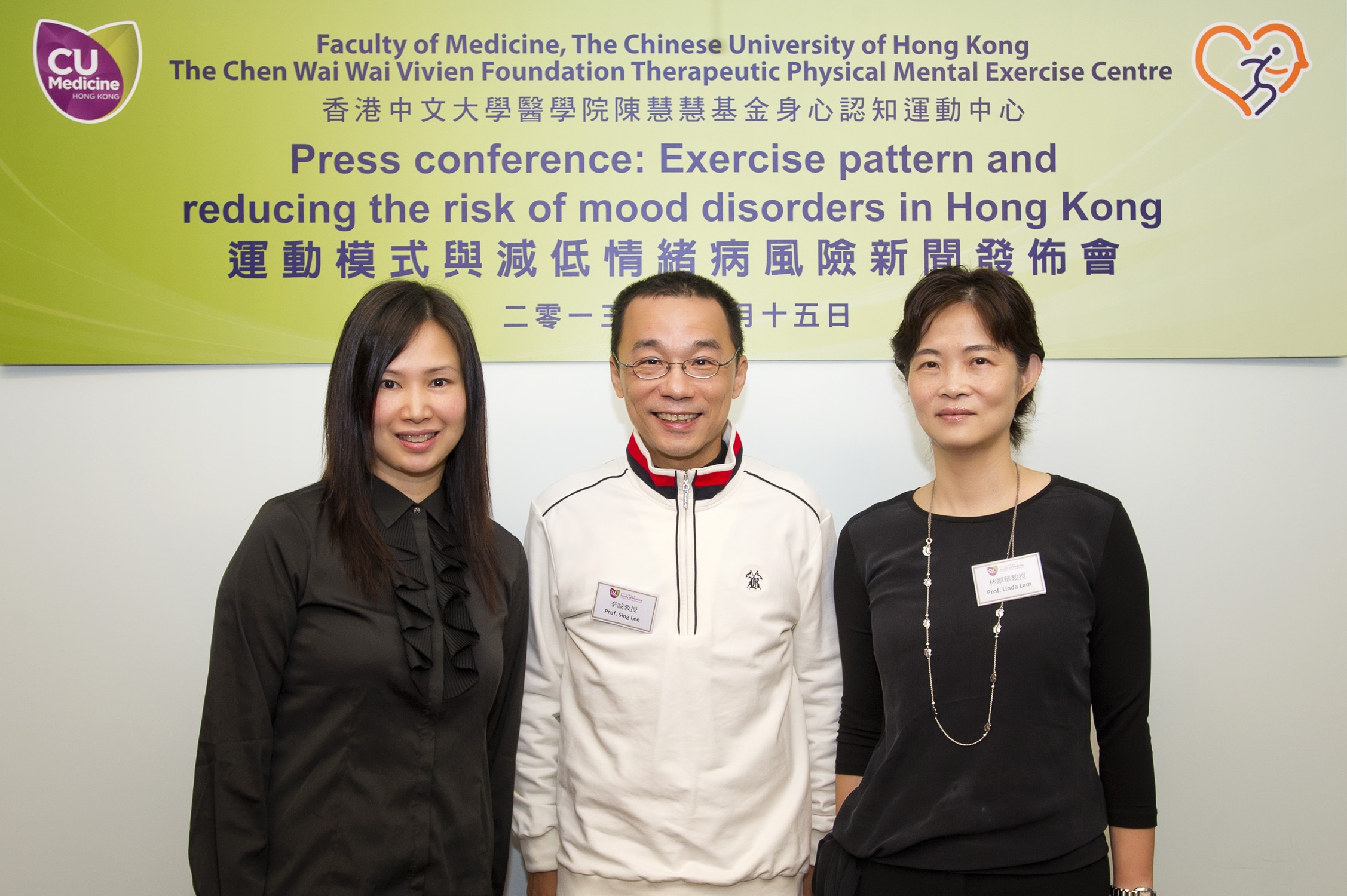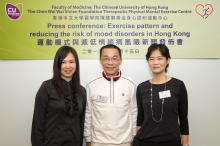CUHK
News Centre
CUHK Survey Reveals Relationship between Exercise Pattern and Emotional Health among Hong Kong People Mind-body Exercise Helps Reduce Risk of Mood Disorders
Recent western studies have indicated that exercise does not only improve physical fitness, but also emotional health. Regular exercise can relieve mental health problems such as anxiety and depression. In view of the lack of large-scale community study on exercise pattern and emotional health in Hong Kong, theChen Wai Wai Vivien Foundation Therapeutic Physical Mental Exercise Center at The Chinese University of Hong Kong (CUHK) recently conducted a large-scale telephone survey to examine exercise pattern and its relationship to the risk of mood disorders among Hong Kong people. The results reveal that regular mind-body exercise, such as Tai Chi, Chi Gong and Yoga, can reduce the risk of mood disorders.
Commissioned by theChen Wai Wai Vivien Foundation Therapeutic Physical Mental Exercise Center, the Faculty of Medicine, CUHK, the Centre for Communication and Public Opinion Survey, CUHK conducted a large-scale telephone survey from May to July 2013 to examine exercise pattern and its relationships to the risk of mood disorders among Hong Kong people. Involving a random sample of 2,744 Hong Kong citizens aged between 18 and 75, the research results show that only half of the respondents (50%) performed ‘regular’ exercise (defined as exercising at least two times a week, each time lasting 30 minutes or more) while 6.4% of respondents didn’t perform any exercise. The research also indicates that their choice of exercise is affected by gender, age and education level.
The widely-used Kessler Psychological Distress Scale (K6) was adopted in the survey to assess the respondents’ risk of mood disorders. Results show that only 3.7% of the respondents who had regular exercise have high risk of mood disorders, as compared to those with non-regular exercise (6.5%) and no exercise at all (13.7%). It also reveals that the risk of mood disorders of people who had regular exercise for less than one year (7.1%) is 1.7-fold higher than those of people who had regular exercise for more than one year (4.2%). Among all kind of exercises, mind-body exercise (such as Tai Chi, Chi Gong and Yoga) is more effective in reducing the risk of mood disorders. Only 4.0 % of the respondents who performed these exercises have a high risk of mood disorders, as compared to aerobic exercise (4.8%) and walking (6.2%). This indicated that although walking has a great impact in physical fitness, not much in emotional health.
Prof. Linda Lam, Principal Investigator and Director of The Chen Wai Wai Vivien Foundation Therapeutic Physical Mental Exercise Centre, remarked, ‘The findings are encouraging which not only facilitate our understanding of the relationship between exercise and emotional health status, but also provide an important baseline for public education and further research in Hong Kong.’ Professor Lam suggested that not all people with mood disorders may need, tolerate, or have easy access to conventional treatments such as drug therapy. A tailor-made programme based on a professionally selected mix of exercises can be developed into an important adjunctive intervention to help an individual recover from mood disorders. The Chen Wai Wai Vivien Foundation Therapeutic Physical Mental Exercise Center is embarking on a number of research projects to facilitate the development. For more information, please visit the official website: http://cwwpmex.med.cuhk.edu.hk.
(From left) Ms. Belinda Yu, Registered Physician, CUHK; Prof. Sing Lee, Department of Psychiatry, CUHK; and Prof. Linda Lam, Principal Investigator and Director of The Chen Wai Wai Vivien Foundation Therapeutic Physical Mental Exercise Center; present their recent survey findings that regular mind-body exercise can reduce the risk of mood disorders。



